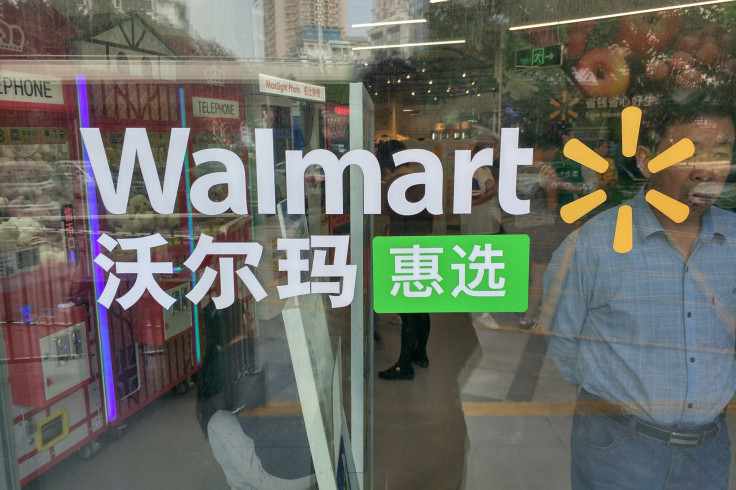Walmart And JD.com Tighten Their Alliance With $500 Million Investment

Walmart (NYSE:WMT) and JD.com (NASDAQ:JD) (the second largest e-commerce player in China) recently co-invested $500 million in Chinese online grocery delivery company Dada-JD Daojia. Dada-JD Daojia was created in 2016 when JD merged JD Daojia — its online-to-offline business, which has about 20 million monthly active users — with Dada Nexus, a crowd-sourced delivery platform that serves over 400 major cities.
This article originally appeared in the Motley Fool.
What this partnership means for Walmart and JD
Walmart already owns a 12 percent stake in JD, which makes the U.S. retail giant the company's second largest corporate stakeholder after Tencent (NASDAQOTH:TCEHY). JD also bought Walmart's Yihaodian e-commerce site, which struggled to gain ground in China, back in 2016.
Walmart initially partnered with Dada-JD Daojia in 2016 to expand its e-commerce footprint across China, where it operates 443 brick-and-mortar stores. That partnership paved the way for deeper alliances with JD and Tencent.
Last year, Walmart, JD, and Tencent's WeChat merged their user data to analyze purchases, make predictive suggestions, offer special discounts, and help vendors promote their products. Walmart and JD also offered special deals for Tencent's WeChat Pay users. This triumvirate was formed to counter the growth of Alibaba (NYSE:BABA) , the 800-pound gorilla of China's e-commerce market.
Earlier this year, Walmart opened a small high-tech supermarket in Shenzhen, China that stocks over 8,000 products — most of which can also be purchased on Walmart's e-commerce site and JD Daojia. Groceries and other goods purchased on JD Daojia can be delivered within 30 minutes to homes located within two kilometers (1.2 miles) of the store.
This partnership was aimed at countering Alibaba's Hema Fresh brick-and-mortar stores, which offer 24-hour delivery services in Shanghai and Beijing. Alibaba expects to operate about 100 Hema Fresh stores by the end of the year. Alibaba's integration of those stores into Ele.me — China's most popular food delivery app — and its Tmall and Taobao marketplaces could strengthen its position in grocery and meal deliveries.
Walmart and JD's fresh investment in Dada-JD Daojia indicates that the two companies are concerned about Alibaba. In addition to its Hema Fresh stores, Alibaba is investing in a growing list of brick-and-mortar retailers like Suning, Sun Art, Lianhua, and InTime. Those moves are expanding Alibaba's retail network and locking retailers into Alipay, the market-leading mobile payments platform from its affiliate Ant Financial.
Will crowdsourced deliveries turn the tide?
Dada-JD Daojia's business is unique because it uses crowdsourced deliveries, which rely on networks of non-professional couriers to deliver goods to customers. This "Uber for deliveries" model is considered a cost-effective solution to the "last mile shipping" dilemma, where traditional logistics networks struggle to deliver goods from nearby fulfillment centers or stores to a customer's doorstep in a cost-effective manner.
Walmart already uses a semi-crowdsourced delivery model in several U.S. markets. It taps "personal shoppers" to fulfill orders, which are subsequently delivered by courier partners like Uber. In China, Walmart already offers Dada-JD Daojia's crowdsourced deliveries at 200 of its stores in 30 cities. Five of JD's core online stores also offer deliveries via Dada-JD Daojia.
This sounds like a solid strategy, but Alibaba has been investing heavily in the expansion of its own logistics network, and uses some of its brick-and-mortar stores as fulfillment centers. It wouldn't be too difficult for Alibaba to launch a competing crowdsourced delivery platform or partner with ride hailing companies like Didi Chuxing (which Alibaba, Tencent, and Baidu all own stakes in) to fulfill last-mile deliveries.
Therefore, crowdsourced deliveries won't turn the tide against Alibaba on their own. However, the combination of JD, Walmart, and Tencent's ecosystems — along with a growing list of anti-Alibaba allies like Alphabet's Google, SINA, and Vipshop — might hold Alibaba at bay.
Suzanne Frey, an executive at Alphabet, is a member of The Motley Fool's board of directors. Leo Sun owns shares of Baidu, JD.com, Sina, and Tencent Holdings. The Motley Fool owns shares of and recommends Alphabet (A shares), Alphabet (C shares), Baidu, JD.com, and Tencent Holdings. The Motley Fool recommends Sina. The Motley Fool has a disclosure policy.





















